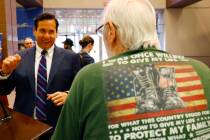Washington Digest: Senate approves defense bill
WASHINGTON — The U.S. Senate last week overwhelmingly approved a $612 billion defense authorization bill over objections from the Obama administration that it evades congressionally mandated spending caps through an accounting loophole.
The measure, which would establish defense policies for the next fiscal year, passed 71-25. Democrats expressed concerns that it includes a nearly $40 billion increase in Overseas Contingency Operations, a war-fighting account that is not subject to automatic budget cuts imposed by the 2011 sequester law.
Sen. Jack Reed of Rhode Island, the leading Democrat on the Armed Services Committee, argued that increasing the contingency fund amounts to deficit spending and would increase pressure on Congress to cut spending from domestic programs.
“If we adhere to the Budget Control Act, we will not adequately fund other agencies, and many of these other agencies are as vital to our national security as the Department of Defense — the FBI, Homeland Security and the State Department,” Reed said.
Sen. John McCain, R-Ariz., who leads the Armed Services Committee, argued that using the war-fighting account to reach the desired spending level might be troublesome but not so much to disqualify the bill from being approved.
“Shouldn’t we care more about the men and women who are serving in the military than the problem you might have with a certain process that was followed in order to get there? I would think not,” McCain said.
The bill includes a 1.3 percent pay raise for troops and would overhaul the military’s retirement program. It would upgrade weapons systems including new F-35B Joint Strike Fighters and Virginia-class submarines, provide $300 million in military aide to Ukraine, reaffirm a ban on torture, and make it more difficult for the military detainment facility to be closed at Guantanamo Bay, Cuba.
The bill now goes to a conference with the House, which passed a $579 billion version of the bill June 11.
Sen. Dean Heller, R-Nev., voted for the bill; Sen. Harry Reid, D-Nev., voted against it.
TRADE BILL REVIVED
The House advanced a measure that would give President Barack Obama “fast track” authority to negotiate trade deals, a week after a similar effort was derailed by Democrats aligned with organized labor.
The previous effort was complicated by a requirement that the House approve two separate measures for Obama to gain “fast track” authority. While one was approved, the second — related to a labor retraining program — failed.
This time, the House needed only to approve a single trade promotion bill. It now must return to the Senate, however, where it could face new resistance from labor-friendly Democrats.
Under “fast track” authority, the president would be allowed to negotiate trade agreements, with Congress limited to approving or rejecting the deals by an up-or-down vote. Obama has argued that similar authority has been given to other presidents and is necessary to secure multinational deals such as the 12-nation Trans-Pacific Partnership now in the works.
Opponents of “fast track” said they do not want to give up their power to influence trade deals, particularly when they fear the negotiators have not pressed strongly enough for job protections for American workers, as well as currency and environmental protections.
The bill was approved, 218-208.
Reps. Mark Amodei, Cresent Hardy and Joe Heck, all R-Nev., voted for it. Rep. Dina Titus, D-Nev., voted against it.
MEDICAL DEVICE REPEAL ADVANCES
The House voted to repeal a 2.3 percent excise tax on medical devices that has helped pay for Obama’s signature health care law. Some Democrats joined Republicans in voting for repeal.
The tax that took effect two years ago raises about $2.4 billion a year to help pay the cost of expanded medical coverage under the Affordable Care Act. House Republicans have targeted the tax — as well as other parts of the ACA — as part of a broader effort to repeal Obamacare.
“The medical device tax is yet another failed policy of Obamacare that not only stifles innovation and costs good-paying jobs, but also threatens access to life-saving and life-improving devices, on which many Americans depend,” Rep. French Hill, R-Ark., said.
The White House has threatened a veto, saying it would provide a tax break to profitable corporations at the expense of families who need help to pay for medical coverage.
The bill was approved, 280-140, with 46 Democrats in support mostly from states where medical devices are manufactured.
Rep. Seth Moulton, D-Mass., said the tax is a burden on small businesses.
“I started a healthcare company following business school. I understand how to help small businesses grow, and I also understand the incredible need for and value of investing in medical technology,” he said. “The medical device tax poses an unnecessary burden on the industry but especially small businesses, and repealing it is simply the right thing to do.”
An economic analysis by the nonpartisan Congressional Research Service said the tax would have a negligible impact and perhaps would cause up to 1,200 job losses.
Amodei, Hardy, Heck and Titus voted to repeal the tax.
TROOP WITHDRAWAL REJECTED
The House overwhelmingly rejected a resolution calling for U.S. troops to be withdrawn from Iraq in the absence of Congress authorizing the use of military force against Islamic militants in the region.
Rep. James McGovern, D-Mass., who offered the privileged resolution, said it was the only instrument available to force a robust debate over Obama’s decision 10 months ago to take up arms against the Islamic State in Iraq and Syria.
“Congress needs to live up to its responsibilities and authorize this war, or by its continuing neglect and indifference, our troops should be withdrawn and come home. It’s that simple,” McGovern said.
The resolution failed 139-288 with Republicans and Democrats arguing that withdrawing troops from the region would harm national security.
“Allowing the president to use current force authorities against ISIS is preferable to refusing to confront the threat ISIS poses to our national security altogether,” said Foreign Affairs Committee Chairman Ed Royce, R-Calif.
Titus supported the resolution. Amodei, Hardy and Heck voted against it.
Contact Peter Urban at purban@reviewjournal.com or at 202-783-1760.


















